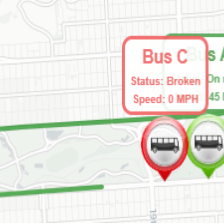Vehicle Tracking Solution
Real-time vehicle tracking systems in the logistics industry
Using a vehicle tracking solution firms that ship products/goods either to their trading partners or customers, can track their trucks and other cargo vehicle in real-time. While the tracking data is available to the firms in real-time about their vehicles which is usually provided using cloud based software, the insights that firms derive by looking at the data collected over time is immense.
Most of the mid-size firms like grocery stores, department stores, firms that provide services like auto-parts delivery, commercial laundry, lease their vehicles on an annual basis and data on the usage of their vehicles like - how much mileage has been accrued, the vehicle performance info, comparison of the traffic along routes over time add immense value by saving time and money.
The vehicle tracking devices are installed in each vehicle under the hood, and these tracking devices are communicating their GPS location information in real-time using cellular technology. The data from the tracking devices is typically stored in a cloud-based system, which the fleet-managers can monitor in real-time if needed and can compare with their schedules over time to gain more insights.
The fleet managers of a firm a) prepare a trip schedule for each driver on a weekly/daily basis for deliveries to different partners using cloud based software b) as vehicle drivers follow their schedule the location data from the trackers is sent to the cloud c) fleet managers monitor the progress of their fleet in real-time and compare it with their original schedules and evaluate the performance of the drivers and vehicles d) fleet managers take necessary action to improve the performance of their fleet by providing training for their drivers and upgrading their fleet.

Vehicle Tracking
The Federal Motor Carrier Safety Association (FMCSA) published a ELD (Electronic Logging Devices) mandate on December 16th, 2015 that requires most commercial vehicles operating in the USA to install ELDs. The main objective of the ELD mandate is to promote safety and accountability within the trucking industry. Apart from tracking the vehicle movements, ELDs also provide the driver duty statuses.
Most of the ELD implementations in the USA is for what is known as long haul trucking when goods are shipped across state lines. The ELD devices capture the driver name, id, date, time, driver’s on-duty or off-duty status, engine hours, vehicle mileage, location information, vehicle information and motor carrier information.
As per the FMCSA mandate a driver cannot drive more than 8 hours continuously on a long-haul and to that extent the ELD will alert if a driver is going to exceed his driving quota. ELD, a device attached to an OBD (on-board diagnostics) port of a truck is paired with a mobile device like a tablet or mobile phone that the driver carries, the data from the mobile device is then uploaded to the cloud. The mobile app that monitors the vehicle information after the driver logs in will provide alerts to the driver before any violation. The ELD mobile apps also provide driver’s records of duty (RODs) that the driver can pull up if stopped by a traffic inspector.
Imagine a situation where the vehicles carry a cellular gateway that monitors all the contents inside the truck, in real-time and businesses have complete visibility of this data, which will lead to better decision making by partners, while preventing wrong deliveries and theft of goods. At 3DES, we are currently developing a solution to address these very needs of fleet managers, to not just know where their vehicles are but what specific batch of goods are being shipped to which customer inside these trucks!
